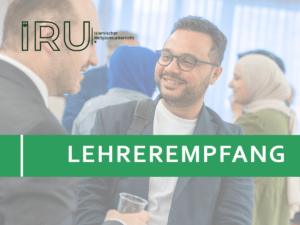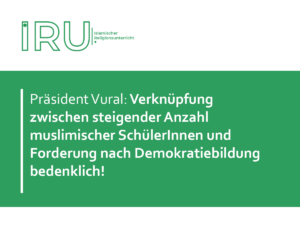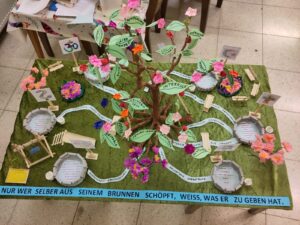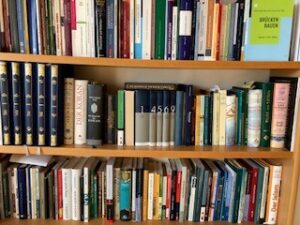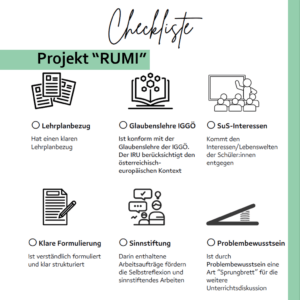Religious education includes Islam lessons in the public school system Austria has a long-standing tradition of acknowledging Islam officially by the state that goes back to the times of the Austrian-Hungarian monarchy when Bosnia was occupied, and more than 600.000 Muslims turned to be citizens of the state. An Islam law was released in 1912. Since 1979 the Islamic Religious Authority (IGGÖ) forms the official body and representation for Muslims in Austria.
In May 1983 Islamic education at public schools was installed. Today more than 80.000 pupils attend these lessons throughout the country who are taught by more than 630 teachers. In Austria all religions that are officially acknowledged may provide religious education within the Austrian public school system. The official religious representation is responsible for the curriculum and chooses the persons who teach. The financing of the teachers and superintendents to provide the lessons and the general organization and quality measurements is seen to by the state. State may not interfere in the religious teachings, but these teachings must not contradict Austrian rule of state/Austrian law. Religious education is part of the general school system. This reflects the Austrian secular system that is based on cooperation. The regulations in religious education are described as “res mixta” (see RS 2021_05).
During the first five days in each school year parents or pupils who are older than 14 (when they gain religious maturity) may choose to unsubscribe religious education they would attend as a mandatory subject otherwise automatically, each one attending the religious class of his/her own denomination. After this time everybody must take part in the religious education. On the other hand, a notice of removal can be withdrawn any time and pupils return to their religious group. Children without a religious denomination may attend any religious group they (or their parents if younger than 14) choose as a “free subject” – the teacher is asked to give his/her consent before. They gain a mark in the school report. But it is not possible for children to attend the religious education of another faith. Anyhow interreligious cooperation gains more and more importance and takes place in different ways from multi-religious celebrations (on certain events like the beginning or the end of the school term) to projects (of different duration) that are prepared by teachers of different faiths (for example on shared responsibility in securing the environment, on the most important religious festivals and their meaning and so on). At A levels during the final examinations religious education may be chosen as a subject for oral exams.
Dealing with minorities in Religious Education
In Austria there is no subject with the sole aim to teach different religions together. Anyho it is interesting to see how religions are depicted in teaching material. There is a scientific study that was published more than 20 years ago and analyses how Islam/Muslims are shown in schoolbooks over the times. This study revealed the repetition of many stereotypes and a tendency of ignoring the self-conception of Muslims. (Susanne Heine (editor): Islam zwischen Selbstbild und Klischee. Köln-Weimar-Wien: Böhlau 1995) Recently greater attention has been paid to correcting such biased views. Sometimes consultation with representatives of the faith community takes place. Nevertheless, this cannot guarantee that all materials are to utmost satisfaction. Especially the new subject “Ethics” that was officially introduced in 2021/22 starting with the 9th schoolyear, brought more publications that are not always in line with what the religious communities would have preferred – which refers to the Catholic Church, as well. It is to be hoped that teachers will critically discuss passages that are somehow too one dimensional and excluding the inner perspective of believers. It is one of the goals of religious education to strengthen pupils in their ability to speak out and be self-confident, although at the same time the phenomena of forcing members of minorities in the role of “the expert” is to be seen as problematic as well as the effect of “othering”.
Approaching and learning about other religious believes
The curriculum aims to provide an insight into other religions, especially in the Abrahamic tradition due to their importance in the European context and as “ahl Kitab”. Mutual respect and acceptance of pluralism shall be evoked in the pupils. The Austrian system opens great opportunities for inter-religious cooperation. This takes place on different levels. Dialogue between the superintendents of the different faiths is installed on a regular basis. Consultations in questions where the organization of religious education is concerned is taking place frequently and helpful in pursuing common interests (negotiating with school authorities on issues of legal relevance etc.) During the challenges of the Corona pandemic this cooperation was enhanced. It was discussed that religious education should offer especially in this time an open space for reflection and orientation – something like “food for the soul”. Via “padlet” materials were offered on a digital platform – Christian and Muslim content side by side. (See Religionsunterricht mal anders (padlet.com)
Selecting appropriate Islam teachers
It is up to the religious community to decide who is allowed to teach – and of course great emphasize is put to the point of selecting appropriate teachers. The ministry of education can influence this process of choosing the teaching personnel in certain ways. For example, the categorization of qualifications is up to school authorities which in consequence has direct implications on the wages – and makes being a teacher more or less attractive. Furthermore, only persons who carry the Austrian (or an EU) citizenship should be chosen to teach. Only if no other sufficiently educated person could be found, it is allowed to take in somebody with foreign nationality. It must be proven that no other teacher could have been appointed. Special attendance is paid to the ability to speak German on level C1 which must be testified. The Islamic supervisory school authority (Schulamt der IGGÖ) together with the Supreme Council of the IGGÖ has installed a hearing process that should guarantee a fair chance for application. Details may be found here: Bewerbung – IGGÖ – Islamische Glaubensgemeinschaft in Österreich (derislam.at)
A commission (all of them superintendents for Islamic religious education plus representatives of the Supreme Council) checks on theological knowledge, educational skills, and teacher personality. Special interest is taken into the talent of building bridges within the school system and intercultural and interreligious capability. To apply candidates should have finished appropriate studies, preferably in Austria as this is closest to the living environment of the children. But there are still many teachers who have finished their studies (mostly in theology) in other countries such as Bosnia, Turkey or Egypt (Al Azhar). Religious education should be contextualized as to the questions and needs of those who attend in the Austrian classrooms. The Islamic Religious Authority has chosen to strengthen the system of authorizing a teacher of Islamic religion by bestowing an “Idschaza” on them. This ceremony took place the first time at the beginning of the school year 2021/22 for all newly appointed teachers.
Teacher training
Since 1998 there exists a special training programme for future teachers of Islam (IRPA – Islamische Religionspädagogische Akademie) that was installed by the Islamic religious authority, the IGGÖ, and financed by the state. Due to a general change in the education system the former IRPA started to cooperate with the KPH Wien Krems (Kirchliche Pädagogische Hochschule) and became part of this institution. The IRPA had been concentrating on the study to be a teacher of Islam. When the regulations changed, and every teacher had to gain a general ability to work on primary school level the IRPA (like similar institutions) could not provide this, and it seemed a good solution to join with KPH. So future teachers now may pick “Islam” as a special interest within their four years of study for four semesters. It is a very preferable effect that future teachers will be incorporated within the school system with a broader perspective (teaching other subjects, as well). And it has proved to be very promising that interreligious competence may be gained while studying next to colleagues of other faiths. More information on the Institut für Islamische Religion an der KPH Wien/Krems: Institut Islam. Religion / KPH and on facebook: Institut Islamische Religion an der KPH Wien/Krems – Startseite | Facebook. There are so far two universities who offer a Master degree in Islamic Religious Education – in Vienna and in Innsbruck: Masterstudium Islamische Religionspädagogik (univie.ac.at) und Institut für Islamische Theologie und Religionspädagogik (uibk.ac.at)
Curricula – guidelines for the quality of Islamic education
The curriculum is in the responsibility of the religious authority. Here the separation of state and religion by way of a “cooperation model” is to be seen again. Naturally it must be in line with the doctrine the IGGÖ had to describe and submit to the state institutions. Curricula mirror the changes not only in the pedagogical approaches but the changes within the Muslim community and the process of creating an identity where it becomes more and more natural to feel Muslim and to regard oneself as part of Austrian/European society, of practicing Islam and values such as democracy, rule of state, pluralism, and human rights.
The first curriculum going back to the starting times nearly forty years ago was very short and concentrating on a classical canon very much in line with an “Ilmihal” kind of teaching. In 2011 a new, very much enlarged curriculum was written (see LAST (derislam.at)) While adopting new guidelines for the final exams (“Matura”) and the consequences in a more competence oriented way of teaching the curriculum of the final years at grammar schools was put in a new form (see IRU_Semestrierung_Oberstufe_AHS_und_BMHS-1.pdf (derislam.at))
Lately another reform process has taken place, following a general revision of all curricula initiated by the ministry of education. The aim is to make curricula more easily understood by not only the teachers, but parents and pupils. The concentration is no longer on certain issues that are enlisted to be studied, but rather on the pedagogical approach to reach certain competences. On the basis of the existing curricula this essence of Islamic religious education was put in words. The key part is the definition of seven competences as basic skills that should be taken into the centre of all teaching efforts:
- SELF-KNOWLEDGE – TRUST IN GOD – DIVERSITY
Gaining an attitude of trust in yourself and in God and being open to the diversity of the
world - CREATION – RESPONSIBILITY – AMANAH
Living relationships responsibly and sensitively in love for creation and protecting and
preserving the environment - BASE OF FAITH – AQIDA
Understanding, reflecting and communicating the unifying Islamic belief base in
contemporary society - RELIGIOUS ACTING – IBADA
Fulfilling religious action individually with meaning beyond mere imitation - DEALING WITH SOURCE TEXT – CONTEXTUALIZATION
Understanding and questioning religious source texts, knowing interpretative traditions and
their methodology and relating them to today’s context and the realities of life in a mature
way - ABILITY TO PLURALISM – SOCIAL COHESION
Knowing commonalities and differences to other religions and worldviews and seeking social
cohesion in an open and appreciative manner - INTERPERSONAL PERSPECTIVES – MU’AMALAT
Combining the sincerity of faith with the willingness to position yourself and acting ethically
in the here and now: worshipping as human service
Challenges of today
Introduction of the subject Ethics into the school system Lately the discussion on the relevance of religious education has tensioned. This comes along with tendencies in society where people seem to feel less attached to churches. The idea of a somehow common education on religion (and not the faith based “into religion”) with a strong secular interest in teaching ethics has gained more and more attraction. (See the popular petition Ethik für alle)
Those religious communities providing religious education at school were invited to present the ethical dimension of their lessons. As a result a public presentation together with the minister of education took place and the results got published on the official website of the ministry (See Ethische Grundfragen in den Lehrplänen des Religionsunterrichts in der Sekundarstufe II – Handreichungen (bmbwf.gv.at) Links to the different papers in pdf form are offered). The religious communities had favoured the introduction of “Ethics” in the way that has now been installed: From the 9th class onwards every pupil who decides to leave religious education automatically takes part in the subject ethics. As to Islamic religious education this seems to have enlarged the number of pupils. Taken to choose between the two, Muslims rather prefer to attend Islamic religious education.
Expectations towards Islamic religious education
At the beginning nearly forty years ago parents saw Islamic religious education as a possibility to strengthen their children’s ties towards the countries of origin. It is still remembered how parents would sometimes ask about the ethnical background of the teacher and if he or she was of different origin than themselves prefer to sign the children off. They had mistaken the subject as something like “local studies” held even in the language of the country of origin. Anyhow those responsible for the introduction of Islamic religious education were always aware of the potential not only to take care of a sound and authentic religious teaching, but of creating a space for intra-religious understanding. When pupils of different background meet this is a chance for fostering an identity where it is normal to live as Muslim and citizen of Austria. Granting children, the same rights as their Christian classmates as to learning about their own religious background gives them a feeling of being respected and helps to create a sense of belonging. Teaching on Islam in German has strong implications on an emotional level. As a result, the notion that Islam is not something “foreign” is strengthened.
Muslim children are often put in situations where they might feel uneasy or even offended about the way their religious background is addressed. To give them the means to be able to talk about their religion is a way of supporting social cohesion and better interreligious and intercultural understanding. Lately the positive influence of religious education in the context of prevention against extremist thinking has been discussed. Although these positive effects have been pointed out in connection with the issue of “integration”, the Islamic Religious Authority (IGGÖ) is rather sceptical to overemphasize this aspect. This has to do with an understanding that religious education bears value as such. Or – by ways of citating the targeting of education as put into the Austrian law: “The Austrian school has the task of contributing to the development of the youth’s disposition according to moral, religious and social values as well as according to the values of the true, the good and the beautiful through teaching appropriate to their level of development and their educational path.” (§2 Schulorganisationsgesetz) Furthermore, presenting Islamic religious education solely from an angle that hints to the “integration” topic, would have the unwanted effect to feed in narratives of Muslim pupils as still in need to get integrated into Austrian society. But many families carry the Austrian citizenship, and it might be counterproductive to eye Islamic religious education as something like a measurement for better integration.
Cooperation between religious education at public schools and in the mosques
Traditional mosque teaching might get positive inspiration by religious pedagogy as performed in the secular school system. Especially the approach to concentrate on competences to be gained is very promising, as it puts the personal development of the pupils in the focus. In ideal circumstances the two systems cooperate closely and complement one another. Mosques offer education that the secular school system cannot provide, but that is essential such as memorizing the Quran (Tajweed). They provide a spiritual surrounding that could not be felt likewise in the classroom. Recent research for example at the University of Göttingen under Univ. Prof. Sebastian Günther shows that modern competence orientation might be found in traditional Islamic education (as with Farabi, Al Gazali, Ibn Rushd). To revive these old traditions in the modern context seems very interesting.
Islamic religious education has a great impact on discourse about “Islam in Europe”. The potential of Islam as religion that due to changes of time, place and society encourages in its self-understanding questions on religious practice, gains great relevance. Pupils come up with urgent questions that mirror the special challenges of our time. This inspires the necessary process of discussing probable approaches that are authentic and in line with Islamic principles. What happens in the classroom may be reflected in a broader intra-Muslim dialogue and give positive food for thought to Muslim scholars and theologians as well as imams.
To foster programmes that bring together the best of the two systems – secular school and mosque – and bridge them might be a very promising way to secure religious education that strengthens Muslim identity in the secular and pluralistic European context while strengthening Muslim citizenship as well. Social cohesion could be sustained and empowered.
Carla Amina Baghajati is Superintendent of the Islamic supervisory school authority
(Schulamt der IGGÖ)

